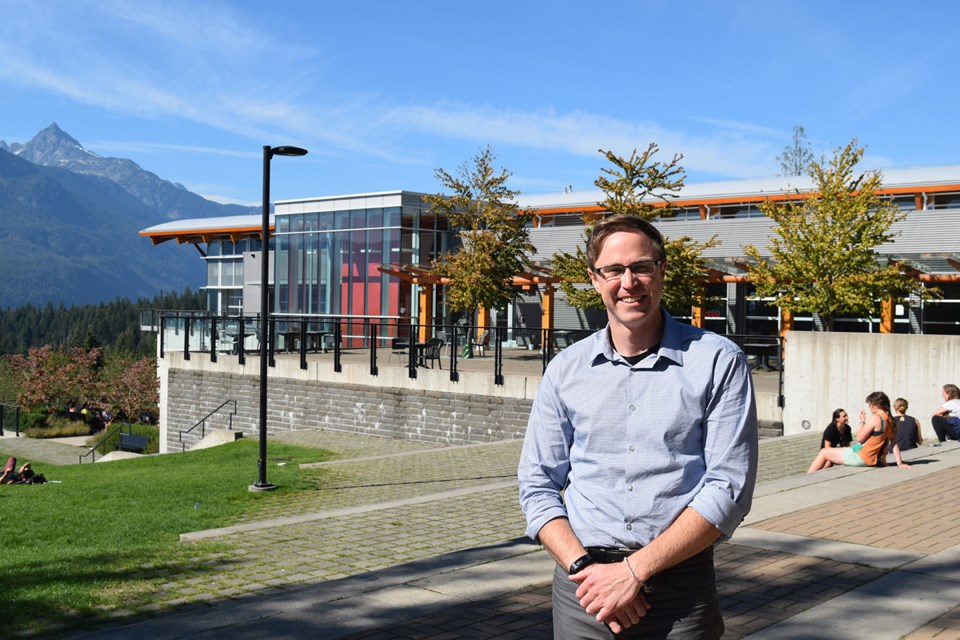Ryan Derby-Talbot’s office reflects the man; Nick-nacks from his time abroad in Japan and Egypt line the walls and a teapot sits among plants along the windowsill.
A tabletop water fountain adds to the eclectic environment. Outside his office’s large picture windows, Derby-Talbot looks over his domain, the Quest University campus. Derby-Talbot is the vice-president and chief academic officer of the school. The Squamish Chief sat down with him for a chat about the quest for knowledge in Squamish. What follows is an edited version of that conversation.
Q: In their first year at Quest, students are asked to think about the definition of knowledge. What is knowledge to you?
A: Most people think of learning and education as getting information and knowing things. This is such a common thing that we will evaluate someone’s intelligence or smartness by their ability to recall facts. I have, over the years… noticed there is a layer that is far beyond the ability to recall facts and information and it has to do with how one holds a problem in the first place. It is really interesting to watch a student faced with a problem, who doesn’t know what to do about it and who will give up and say a statement like ‘Well, I am just not smart enough because I didn’t know how to do something,’ versus a student who will take a problem and not know what to do, but will do the only thing one can do in those moments, which is trial and error and fumble and blunder and work ones way through. I think a person who engages in that process expands their ability to deal with knowledge.
Q: Are we doing a good job of getting kids in public school to that point?
A: The pressure to focus on content and information is really great. I think the new B.C. curriculum that we are starting to see rolled out is taking a step in the direction of helping to foster those skills that one engages in problem solving. I think more awareness is coming about this. One of the great things is that entrepreneurship has really taken hold in our culture as a legitimate professional vehicle, whereas in the ’60s you became a professional – a doctor or lawyer or whatever – and you were the expert by designation. Whereas the entrepreneur shows that you can be someone who is more of a livewire, more of an experimenter, and so there is a way in which our culture is embracing a broader understanding of this. Quest is tailored exactly to that world.
Q: What was your path to Quest?
A: I am American originally and I grew up in Nevada. I was a math major and a philosophy minor and then I went and taught English in Japan for a year and got very interested in cultural perspectives. I did my graduate work in Texas in math and my first job was at the American University in Cairo, Egypt before coming to Quest.
When I was in Egypt I started doing a different kind of calculus course where we did less focus on exams and more on projects where they had problems without formulas. The students really struggled at first. The next semester my class had a waitlist of 50 students and by then I had heard about Quest and thought that this is such a great step forward; this idea of trying to provide educational experiences that let the students take ownership and do direct observation of their own problem solving, rather than trying to tell them the steps or what their educational plan should be through a major.
Q: One of the criticisms of Quest is that it is a school only for the rich. Can you address that?
A: A common critique of this kind of model of an independent arts and science university is that it is expensive. If you look at cost per student, our tuition of $31,000 a year is about the same as what it takes to educate a UBC student, it is just that the government foots a large part of the bill for the UBC student so that the student them self is contributing a smaller amount. It is the same cost. We have a significant scholarship, bursary and financial aid because our kind of model requires diversity and you don’t get that if you are only targeting one socio-economic group. When students apply, part of what they do is apply for financial aid and that will be evaluated and it is very much part of what we do to ensure that students have an opportunity to come here.
Q: What is your relationship to Squamish?
A: I have been in Squamish since 2009. I came that summer, before the Olympics started. I have been living here ever since.
The changes that are happening in Squamish are interesting and it is exciting to see some of the diversification that is happening. I was up the Gondola the other day and it is interesting to see these kinds of projects that are helping to develop Squamish in some new ways and I think these are all positive changes. The community is starting to feel quite vibrant.
About a local is a new and recurring community feature.




